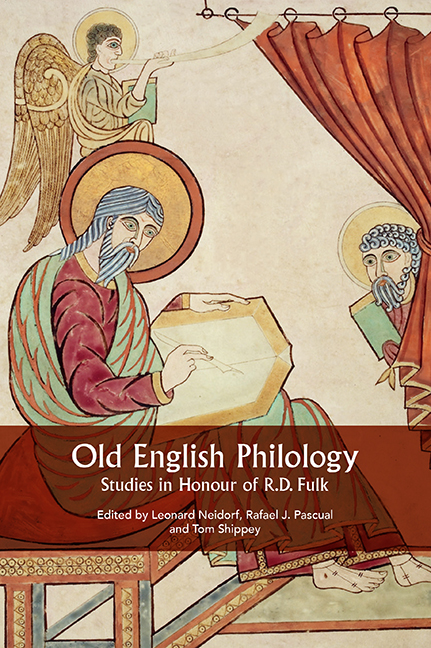Book contents
- Frontmatter
- Contents
- List of Illustrations
- Acknowledgements
- List of Contributors
- Introduction: R.D. Fulk and the Progress of Philology
- 1 Sievers, Bliss, Fulk, and Old English Metrical Theory
- 2 Ictus as Stress or Length: The Effect of Tempo
- 3 Metrical Criteria for the Emendation of Old English Poetic Texts
- 4 The Suppression of the Subjunctive in Beowulf: A Metrical Explanation
- 5 Metrical Complexity and Verse Placement in Beowulf
- 6 Alliterating Finite Verbs and the Origin of Rank in Old English Poetry
- 7 Prosody-Meter Correspondences in Late Old English and Poema Morale
- 8 The Syntax of Old English Poetry and the Dating of Beowulf
- 9 The Anglo-Saxons and Superbia: Finding a Word for it
- 10 Old English gelōme, gelōma, Modern English loom, lame, and Their Kin
- 11 Worm: A Lexical Approach to the Beowulf Manuscript
- 12 Wulfstan, Episcopal Authority, and the Handbook for the Use of a Confessor
- 13 Some Observations on e-caudata in Old English Texts
- 14 The Poetics of Poetic Words in Old English
- 15 Dream of the Rood 9b: A Cross as an Angel?
- 16 The Fate of Lot’s Wife: A ‘Canterbury School’ Gloss in Genesis A
- 17 Metrical Alternation in The Fortunes of Men
- 18 The Originality of Andreas
- 19 The Economy of Beowulf
- 20 Beowulf Studies from Tolkien to Fulk
- The Writings of R.D. Fulk
- Index
- Tabula Gratulatoria
- Anglo-Saxon Studies
15 - Dream of the Rood 9b: A Cross as an Angel?
Published online by Cambridge University Press: 29 May 2021
- Frontmatter
- Contents
- List of Illustrations
- Acknowledgements
- List of Contributors
- Introduction: R.D. Fulk and the Progress of Philology
- 1 Sievers, Bliss, Fulk, and Old English Metrical Theory
- 2 Ictus as Stress or Length: The Effect of Tempo
- 3 Metrical Criteria for the Emendation of Old English Poetic Texts
- 4 The Suppression of the Subjunctive in Beowulf: A Metrical Explanation
- 5 Metrical Complexity and Verse Placement in Beowulf
- 6 Alliterating Finite Verbs and the Origin of Rank in Old English Poetry
- 7 Prosody-Meter Correspondences in Late Old English and Poema Morale
- 8 The Syntax of Old English Poetry and the Dating of Beowulf
- 9 The Anglo-Saxons and Superbia: Finding a Word for it
- 10 Old English gelōme, gelōma, Modern English loom, lame, and Their Kin
- 11 Worm: A Lexical Approach to the Beowulf Manuscript
- 12 Wulfstan, Episcopal Authority, and the Handbook for the Use of a Confessor
- 13 Some Observations on e-caudata in Old English Texts
- 14 The Poetics of Poetic Words in Old English
- 15 Dream of the Rood 9b: A Cross as an Angel?
- 16 The Fate of Lot’s Wife: A ‘Canterbury School’ Gloss in Genesis A
- 17 Metrical Alternation in The Fortunes of Men
- 18 The Originality of Andreas
- 19 The Economy of Beowulf
- 20 Beowulf Studies from Tolkien to Fulk
- The Writings of R.D. Fulk
- Index
- Tabula Gratulatoria
- Anglo-Saxon Studies
Summary
Because he is our honorand, R.D. Fulk will be forgiven the pun in calling line 9b in The Dream of the Rood a “much discussed crux,” to which, he goes on to say “no entirely satisfactory solution has been found” (2001: 68). The poem's unique and provocative re-imagining of a central paradox of Christianity has made it a favorite in student anthologies, which is one reason the half-line has elicited so many emendations and interpretations. Without a consensus, individual editors must come to a decision about it. At first glance the wording in the Vercelli Book corresponding to lines 9b–10a, be heoldon þær engel dryht nes ealle fægere þurh forð ge sceaft, may not seem problematic because the general sense of reverent gazing is fairly clear from the immediate context (Vercelli Book: fol. 104v). However, it presents enough syntactic, metrical, and semantic challenges that the specific sense remains unsettled. Who is looking? Who or what is the object of the gaze? As if to demonstrate the intractability of the verse, Fulk offers different readings in two recent classroom editions. His Eight Old English Poems sets aside Pope's earlier emendation and edits the half-line as behēold on þām engel dryhtnes (“an angel of the Lord watched them [the five jewels]”; Fulk 2001: 9 and 68–9). And in his Introductory Grammar of Old English the clause reads behēoldon þǣr engeldryhte (“hosts of angels beheld [the jewels or spectacle] there”; Fulk 2014: 214). Both revised half-lines are punctuated as parenthetic asides, and both make an angel or angels the subject of the verb of gazing. To point out the two readings is certainly no criticism – each has much to recommend it, and every editor is entitled to change his mind – but it does serve to point out how fraught the passage has been.
My contribution to this topic reconsiders the semantic range of Old English engel, which as an early loanword had different connotations from Modern English “angel,” shaped by its rich history in art, literature, theology, and popular culture. First, however, it is necessary to lay out the reasons why this short passage has attracted such diverse emendations and interpretations. After the first-person narrator's opening lines introducing his dream-vision, the poem begins the description of the extraordinary treo.
- Type
- Chapter
- Information
- Old English PhilologyStudies in Honour of R.D. Fulk, pp. 276 - 291Publisher: Boydell & BrewerPrint publication year: 2016
- 1
- Cited by



